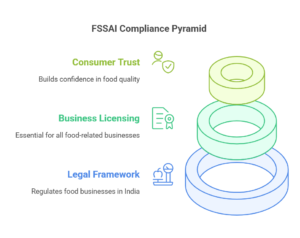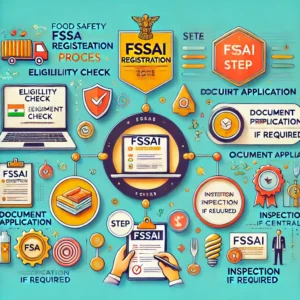Introduction

FSSAI Registration Process: Complete Guide (2025)
The food industry in India is growing fast, but food safety and legal compliance are just as important. If you run a food business, getting an FSSAI license should be a priority. It ensures that your food is safe, hygienic, and meets legal standards.
The Food Safety and Standards Authority of India (FSSAI) regulates food businesses under the Food Safety and Standards Act, 2006. Whether you own a restaurant, cloud kitchen, bakery, catering service, or food manufacturing unit, an FSSAI license is essential. It builds customer trust and shows that you care about food quality. Moreover, it helps you follow food safety laws and avoid legal issues.

Why Do You Need an FSSAI License?
✅ Earn Customer Trust – Following food safety standards boosts credibility and attracts more customers.
✅ Stay Legally Compliant – Avoid hefty fines and ensure smooth business operations with proper licensing.
✅ Improve Hygiene Standards – Implementing food safety protocols promotes better quality control.
✅ Expand Your Business – Many eCommerce platforms and retailers mandate FSSAI registration for partnerships.
Topics Covered in This Post:
- What is FSSAI?
- FSSAI Registration Process
- Why is FSSAI Registration Important?
- What is FSSAI Registration?
- Who Needs FSSAI Registration?
- Types of FSSAI Registration (Basic, State, Central)
- Step-by-Step Procedure for FSSAI Registration
- FSSAI Registration Fees (1 year, 2 years, 5 years, home kitchen)
- Common Issues Faced During FSSAI Registration & Solutions
- FAQs on FSSAI Registration
What is FSSAI? and what is FSSAI Registration Process
The Food Safety and Standards Authority of India (FSSAI) is a government body under the Ministry of Health & Family Welfare. It ensures food safety and hygiene across India. Established under the Food Safety and Standards Act, 2006, FSSAI sets quality standards to ensure that the food we consume is safe.
For more details, visit the official FSSAI website.
Why is FSSAI Registration Important?
✅ Ensure Legal Compliance – Adhere to food safety laws and regulations to operate smoothly.
✅ Gain Consumer Trust – Establish credibility and build confidence among your customers.
✅ Avoid Legal Penalties – Stay protected from fines and regulatory issues.
✅ Meet Business Requirements – Essential for both eCommerce platforms and offline food ventures.
✅ Fuel Business Growth – Expand your brand presence and boost market recognition.
✅ Facilitate Export & Trade – Align with international food safety standards for global reach.
✅ Improve Quality & Hygiene – Comply with GMP, HACCP, and ISO 22000 for better food safety.
✅ Strengthen Supply Chain – Enhance FSMS protocols and streamline vendor approvals.
🔗 Check FSSAI regulations here
What is FSSAI Registration Process?
FSSAI registration is a mandatory legal requirement for all food businesses in India. It ensures compliance with food safety regulations, protecting public health. Without an FSSAI license, businesses risk heavy fines, closure, or legal action.
Penalties for Non-Compliance
❌ Operating Without an FSSAI License – Businesses may face fines up to ₹5 lakh or even closure.
❌ Selling Substandard Food – Non-compliance with quality standards can lead to penalties of up to ₹5 lakh.
❌ Misleading Advertisements – False claims in marketing can result in a hefty fine of up to ₹10 lakh.
❌ Food Contamination Violations – Serious offenses may lead to legal action, including imprisonment.
Who Needs FSSAI Registration?
- Home-based bakers selling online (Basic FSSAI Registration)
- Restaurants & Cafés earning above ₹12 lakh/year (State License)
- Food exporters & large manufacturers (Central License)
- Cloud kitchens & food delivery services (State License)
- Milk processing units producing over 50,000 liters/day(Central License)
- Packaged food manufacturers & wholesalers (State/Central License)
- Dairy units, meat processing plants, and seafood businesses (Central License)
- Catering businesses & food canteens in corporates, schools, and hospitals (State License)
- Food ingredient suppliers & traders (State License)
- Cold storage, warehouses & food transporters (State/Central License)
- Edible oil processing & re packers (State License)
- Retailers, grocery stores, and supermarkets (Basic/State License)
- Dietary supplements & nutraceuticals businesses (Central License)
- Pet food manufacturers & sellers (State License)
- Sweet shops & bakery units (State License)
[Find out which license you need](https://foscos.fssai.gov.in/)
Type of FSSAI Registration and Eligibility Criteria
| Type of FSSAI Registration | Eligibility Criteria |
| Basic Registration | Turnover up to ₹12 lakh/year |
| State License | Turnover between ₹12 lakh - ₹20 crore/year |
| Central License | Turnover above ₹20 crore/year importers, exporters |
Apply for your FSSAI license](https://foscos.fssai.gov.in/)
FSSAI Registration Fees
| License Type | Fees (Per Year) |
| Basic Registration | ₹100 |
| State License | ₹2000-₹5000 |
| Central License | ₹7500 |
FSSAI License Fees for Multiple Years:
- 1 Year: ₹100 – ₹7,500 based on license type
- 2 Years: Fees multiplied accordingly
- 5 Years: Fees adjusted as per duration
Step-by-Step Procedure for FSSAI Registration

Step 1: Check Eligibility for FSSAI Registration Process
Identify the type of FSSAI license required based on annual turnover, business operations, and food category.
Step 2: Gather Required Documents
Ensure you have the necessary documents for FSSAI registration:
✔ Identity Proof (Aadhar, PAN Card)
✔ Business Address Proof
✔ Food Safety Management System (FSMS) Plan
✔ Product List & Business Plan
✔ NOC from Municipality/Panchayat
✔ Import Export Code (For Importers)
Step 3: Apply for Registration on FoSCoS Portal
1️⃣ Visit FSSAI FoSCoS Portal
2️⃣ Click “Apply for FSSAI Registration”
3️⃣ Fill out the online application form
4️⃣ Upload the required documents
5️⃣ Pay the FSSAI registration fees
Step 4: Inspection & Approval
🔍 State & Central Licenses may require a site inspection by FSSAI officials.
📜 Upon approval, the business receives an FSSAI Registration Certificate.
Common Issues Faced During FSSAI Registration & How to Avoid Them
1. Incorrect Documentation
❌ Issue: Submission of incomplete or incorrect documents can lead to rejection.
✅ Solution: Double-check all documents before uploading and ensure they are properly attested.
2. Incorrect Selection of License Type
❌ Issue: Applying for the wrong type of FSSAI license (Basic instead of State or Central) may cause delays.
✅ Solution: Use FSSAI’s eligibility criteria or consult an FSSAI expert to determine the correct license type.
3. Address Mismatch
❌ Issue: If the business address on the application does not match official proof, registration may be rejected.
✅ Solution: Ensure the address matches the legal business address in all documents.
4. Not Following Hygiene & Safety Standards
❌ Issue: FSSAI inspectors may reject applications if hygiene and safety standards are not met.
✅ Solution: Implement Good Manufacturing Practices (GMP), sanitation measures, and maintain proper records.
5. Delay in Inspection & Approval
❌ Issue: Applications may remain pending for months due to inspection delays.
✅ Solution: Regularly follow up via the FoSCoS portal and ensure full compliance.
Checklist for a Successful FSSAI Application or FSSAI Registration Process
✔ Choose the right FSSAI license type
✔ Keep all documents updated
✔ Provide accurate business details
✔ Follow hygiene & food safety standards
✔ Track your application status regularly at FoSCoS
Frequently Asked Questions (FAQs)
How long does FSSAI registration take?
- Basic Registration: 7-10 working days.
- State License: 15-30 days (including inspection if required).
- Central License: 25-45 days (subject to verification and inspection).
Can I sell food without an FSSAI license?
No, selling food without an FSSAI license is illegal in India. Businesses operating without a license can face penalties of up to ₹5 lakh and possible closure.
How do I download my FSSAI Registration Certificate?
- Log in to FoSCoS Portal.
- Click on “My Licenses”.
- Select “Download Certificate”.
How to get a FSSAI license in 2 days?
If you need an FSSAI license urgently, follow these steps:
Apply for Basic FSSAI Registration – If your turnover is under ₹12 lakhs, opt for the Basic FSSAI Registration, which is quicker to process.
Use a Third-Party Consultant – Many agencies offer expedited processing for an additional fee.
Ensure All Documents Are Ready – Avoid delays by preparing all necessary documents in advance.
Submit a Self-Declaration – In some cases, submitting a self-declaration can help speed up approval.
Follow Up with the Authority – After submission, regularly check your application status on the FoSCoS Portal and contact officials if needed.
Is it Easy to Get an FSSAI License?
Yes, the Basic FSSAI Registration is simple and can be done online in 7-10 days. State and Central Licenses take longer due to inspections. To speed up the process, ensure all documents are ready, apply via FoSCoS, and follow up regularly.
Which are the three types of FSSAI license?
Basic Registration – For small businesses with an annual turnover of up to ₹12 lakhs.
State License – For medium businesses with a turnover between ₹12 lakhs – ₹20 crores.
Central License – For large businesses with a turnover above ₹20 crores, including importers and exporters.
What is Category 13 in FSSAI?
Category 13 in FSSAI covers ready-to-eat sa vouries like namkeens, chips, roasted nuts, and papads.
Is a FSSAI license mandatory for a Kirana store?
Yes, an FSSAI license is mandatory for a Kirana store, with registration type based on turnover.
Conclusion
Obtaining an FSSAI license is crucial for running a food business in India. It ensures compliance with food safety standards, boosts consumer confidence, and protects businesses from legal issues. The registration process is straightforward, and applying through the FoSCoS portal simplifies it. Ensure you stay compliant and renew your license to avoid penalties and ensure smooth business operations of FSSAI Registration Process.
🔗 Useful Links:
Apply for FSSAI Registration: FoSCoS Portal
FSSAI Guidelines & FAQs: FSSAI Official Website
please check our other articles HACCP Plan – The Ultimate Guide

Pingback: FSSAI License Renewal: Online Process, Fees & Required Documents -
Pingback: HACCP Plan – The Ultimate Guide -